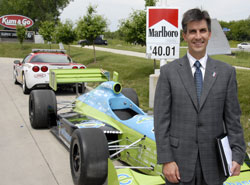An energy cooperative has successfully completed a test burn of 150 tons of biomass pellets to produce electricity at a power facility near Kansas City, Missouri… a first for biomass pellets in the U.S.
 This story on redOrbit.com says the Show Me Energy Cooperative (SMEC) has produced the power at the Aquila power company’s generating facility at Sibley, Missouri from pellets made of non-grain bearing crops of cellulose, including switchgrass, cornstalks, cereal straws, fescue straw and other agricultural residues or energy crops that have no food value:
This story on redOrbit.com says the Show Me Energy Cooperative (SMEC) has produced the power at the Aquila power company’s generating facility at Sibley, Missouri from pellets made of non-grain bearing crops of cellulose, including switchgrass, cornstalks, cereal straws, fescue straw and other agricultural residues or energy crops that have no food value:
Steve Flick, Chairman of the Board, states, “This is our first pilot project of utilizing biomass pellets in Missouri for coal firing. On behalf of our Farmer Members and its Board Of Directors, we are proud to be a part of this historical event. We look forward to working with the State of Missouri  regulatory groups, Aquila and Kansas City Power & Light to provide economic opportunity to local farmers while reducing our dependence on fossil fuels.”
regulatory groups, Aquila and Kansas City Power & Light to provide economic opportunity to local farmers while reducing our dependence on fossil fuels.”
SMEC’s goal is to produce thousands of tons of renewable energy pellets to displace non-renewable fuel. If adopted on a global scale, this has the potential to displace millions of tons of greenhouse gases, which are responsible for today’s climate change crisis. While others are relying on food crops to create energy, SMEC is demonstrating a sustainable, environmentally friendly way that doesn’t threaten the food supply or skew the market.
Not only does the process make power from renewable, non-food source natural feedstocks, it saves more than 250 tons of C02.


 As you might remember from
As you might remember from 
 The first practice session for the Iowa Corn Indy 250 is just about to conclude and Team Ethanol’s #17 car is doing very well.
The first practice session for the Iowa Corn Indy 250 is just about to conclude and Team Ethanol’s #17 car is doing very well. I finally got to meet the Team Ethanol driver, Ryan Hunter-Reay. Ryan was on hand at the Kum & Go pump promotion and posed here with the Highway Patrolmen who helped us with security and traffic and other drivers. He’s the tall guy on the left.
I finally got to meet the Team Ethanol driver, Ryan Hunter-Reay. Ryan was on hand at the Kum & Go pump promotion and posed here with the Highway Patrolmen who helped us with security and traffic and other drivers. He’s the tall guy on the left. There were several IndyCar drivers on hand at the Kum & Go ethanol pump promotion in Ankeny, IA. One of them was Ed Carpenter,
There were several IndyCar drivers on hand at the Kum & Go ethanol pump promotion in Ankeny, IA. One of them was Ed Carpenter,  The Senior Vice President of Marketing for
The Senior Vice President of Marketing for 

 “All three of us have a roll to play in this industry,” Nuernberg says. “We are looking at all the initiatives under way by the different organizations, how we can work together, and make sure we’re not duplicating effort.”
“All three of us have a roll to play in this industry,” Nuernberg says. “We are looking at all the initiatives under way by the different organizations, how we can work together, and make sure we’re not duplicating effort.” EPIC’s main focus is to drive demand with consumers, while RFA’s role is to protect and promote policy in Washington DC, and ACE is the grassroots organization dedicated to expansion of ethanol production.
EPIC’s main focus is to drive demand with consumers, while RFA’s role is to protect and promote policy in Washington DC, and ACE is the grassroots organization dedicated to expansion of ethanol production.